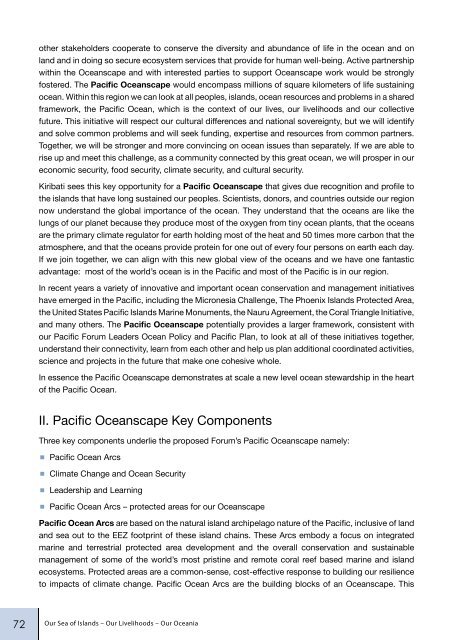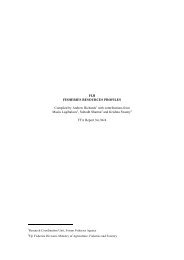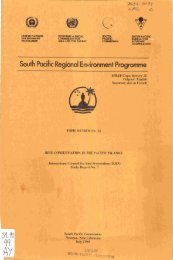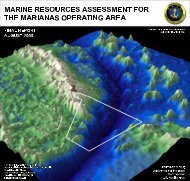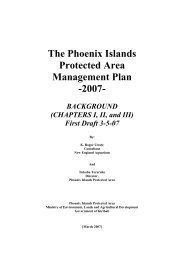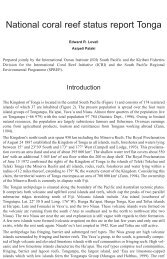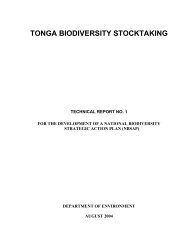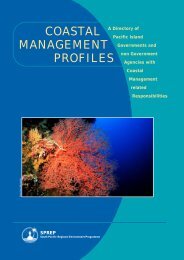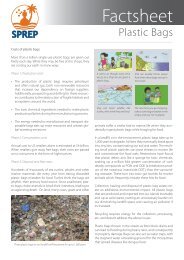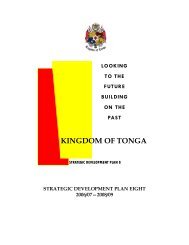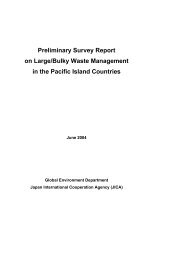Our Sea of Islands Our Livelihoods Our Oceania - SPREP
Our Sea of Islands Our Livelihoods Our Oceania - SPREP
Our Sea of Islands Our Livelihoods Our Oceania - SPREP
Create successful ePaper yourself
Turn your PDF publications into a flip-book with our unique Google optimized e-Paper software.
other stakeholders cooperate to conserve the diversity and abundance <strong>of</strong> life in the ocean and on<br />
land and in doing so secure ecosystem services that provide for human well-being. Active partnership<br />
within the Oceanscape and with interested parties to support Oceanscape work would be strongly<br />
fostered. The Pacific Oceanscape would encompass millions <strong>of</strong> square kilometers <strong>of</strong> life sustaining<br />
ocean. Within this region we can look at all peoples, islands, ocean resources and problems in a shared<br />
framework, the Pacific Ocean, which is the context <strong>of</strong> our lives, our livelihoods and our collective<br />
future. This initiative will respect our cultural differences and national sovereignty, but we will identify<br />
and solve common problems and will seek funding, expertise and resources from common partners.<br />
Together, we will be stronger and more convincing on ocean issues than separately. If we are able to<br />
rise up and meet this challenge, as a community connected by this great ocean, we will prosper in our<br />
economic security, food security, climate security, and cultural security.<br />
Kiribati sees this key opportunity for a Pacific Oceanscape that gives due recognition and pr<strong>of</strong>ile to<br />
the islands that have long sustained our peoples. Scientists, donors, and countries outside our region<br />
now understand the global importance <strong>of</strong> the ocean. They understand that the oceans are like the<br />
lungs <strong>of</strong> our planet because they produce most <strong>of</strong> the oxygen from tiny ocean plants, that the oceans<br />
are the primary climate regulator for earth holding most <strong>of</strong> the heat and 50 times more carbon that the<br />
atmosphere, and that the oceans provide protein for one out <strong>of</strong> every four persons on earth each day.<br />
If we join together, we can align with this new global view <strong>of</strong> the oceans and we have one fantastic<br />
advantage: most <strong>of</strong> the world’s ocean is in the Pacific and most <strong>of</strong> the Pacific is in our region.<br />
In recent years a variety <strong>of</strong> innovative and important ocean conservation and management initiatives<br />
have emerged in the Pacific, including the Micronesia Challenge, The Phoenix <strong>Islands</strong> Protected Area,<br />
the United States Pacific <strong>Islands</strong> Marine Monuments, the Nauru Agreement, the Coral Triangle Initiative,<br />
and many others. The Pacific Oceanscape potentially provides a larger framework, consistent with<br />
our Pacific Forum Leaders Ocean Policy and Pacific Plan, to look at all <strong>of</strong> these initiatives together,<br />
understand their connectivity, learn from each other and help us plan additional coordinated activities,<br />
science and projects in the future that make one cohesive whole.<br />
In essence the Pacific Oceanscape demonstrates at scale a new level ocean stewardship in the heart<br />
<strong>of</strong> the Pacific Ocean.<br />
II. Pacific Oceanscape Key Components<br />
Three key components underlie the proposed Forum’s Pacific Oceanscape namely:<br />
Pacific Ocean Arcs<br />
Climate Change and Ocean Security<br />
Leadership and Learning<br />
Pacific Ocean Arcs – protected areas for our Oceanscape<br />
Pacific Ocean Arcs are based on the natural island archipelago nature <strong>of</strong> the Pacific, inclusive <strong>of</strong> land<br />
and sea out to the EEZ footprint <strong>of</strong> these island chains. These Arcs embody a focus on integrated<br />
marine and terrestrial protected area development and the overall conservation and sustainable<br />
management <strong>of</strong> some <strong>of</strong> the world’s most pristine and remote coral reef based marine and island<br />
ecosystems. Protected areas are a common-sense, cost-effective response to building our resilience<br />
to impacts <strong>of</strong> climate change. Pacific Ocean Arcs are the building blocks <strong>of</strong> an Oceanscape. This<br />
72 <strong>Our</strong> <strong>Sea</strong> <strong>of</strong> <strong>Islands</strong> – <strong>Our</strong> <strong>Livelihoods</strong> – <strong>Our</strong> <strong>Oceania</strong>


